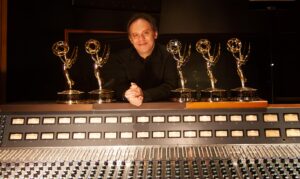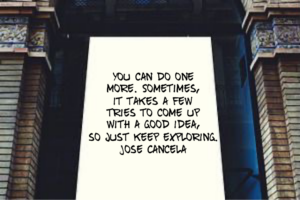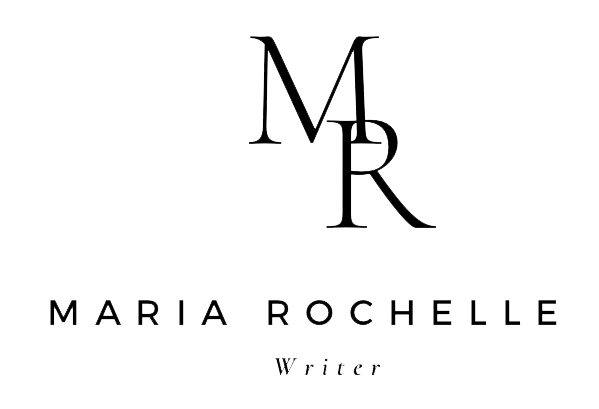
My newest chat is with Jose Manuel Cancela from Spain. He’s a five time Emmy award-winning composer. He shares with me the joys and challenges of being a composer. He also shares three fun facts, which I enjoy learning about from all the creatives I interview.
Besides being a composer, he’s also a musician and worked with diverse artists such as Celia Cruz, Backstreet Boys, Chick Corea, U2, and Janet Jackson. I’ve listened to his film scoring, and it’s quite a diverse range of music, so I can imagine his work with the artists is amazing.
Learn more about this very talented composer and his love of composing.
Introducing Jose…
What do you love about your life right now?
I love that technology is at a point where a much more diverse group of authors can begin to make movies, and composers such as myself get the opportunity to work on much more diverse content, giving us opportunities to be much more experimental and creative than in the past.
From just a little of I’ve learned about film and TV composers in the past year, your way of storytelling is through your music. When did your journey of composing music begin? Also, was this your childhood dream?
As a child, my dream was to play in a band and tour the world, which later in life, I got to do, and I loved every second of it. I had done some songwriting when I was in college, but I had never really thought about being a composer. A very close call on 9/11 changed my mind, and I quit the touring business. Shortly afterward, an opportunity to compose a score for a film presented itself quite unexpectedly, and I fell in love with the process. That moment where you see music seamlessly “shaking hands” with the movie footage is priceless, and I quickly wanted to learn all about the art of film scoring.
I have been enjoying your music from your website, and I can tell you’re very passionate about it. What drives your passion to compose music?
The saying “Where words fail, music speaks” is so true. There are so many shades of different emotions that can be explored musically. Your note choices, your orchestration, your writing, etc. can affect how intensely the viewer can perceive an emotion. It’s really a wide spectrum that you can play with, and it can have very surprising results, especially when you leave commercial tastes aside and dive into unknown territory, melodically, harmonically, and tonally speaking.
One reason I love films is because of the film scores. One of my favorites is Braveheart. You have scored music for different genres. The Last Narc, The Opening Act, Freaky Friday, and Buffalo Daze, to name just a few that you’ve composed music for. By the way, two of my favorites are: Man in The Arena (lovely and inspiring) and Irish Mikey, from Lowell, (so fun to listen to). You have amazing talent! So, tell me, how do compose for a film or TV show? What’s your process?
I watch the film multiple times while focusing solely on the dialogue, and I review my notes from conversations with the filmmakers. After that, I set the material aside and start to brainstorm ideas. My process involves Transcendental Meditation and stillness, so my right brain can “work the problem,” so to speak. So far, knock on wood, I have been successful in generating themes. Once I have some ideas firmly in my head, my job becomes to shape these ideas into the film with the appropriate orchestration, tempo, and other elements.
Share with me the joys and challenges of composing.
The fun for me is expressing a musical emotion that different composers have likely interpreted differently over the last 100 years. The flip side is that you must find a new way to musically create the same feeling without losing originality. Thankfully, we now have so many tools at our disposal that the number of combinations of sounds is infinite, and you can score the same scene in a wide variety of ways, depending on the tastes of the Filmmakers.
Your most recent work was with the film Buffalo Daze. How did you become involved with this film?
William Hoshal and I had been talking about working on a project together for a while. My agent arranged a meeting with the director for Buffalo Daze, and I immediately got his vision for the score. I also saw it as the perfect vehicle for William and me to write a musical love letter to all the great composers who have scored Western movies, such as Ennio Morricone, Bruce Broughton, James Horner, Elmer Bernstein, and John Debney.
You’re a five time Emmy Award-winning film/TV composer. Congrats and that’s impressive! Buffalo Daze, from what I’ve read, is possibly in the running for an Oscar. How does it feel to be part of a film that may receive an Oscar nomination? And, who knows, maybe the film will receive a nomination and win.
It’s humbling, to say the least. Some of my happiest memories of my childhood were watching Bonanza with my late father. So, for me to be the composer for a Western film after all those years and for it to be in the running for an Oscar is pretty surreal.
The film score to a television show or a film is just as important as the actors, director and screenwriter. I believe the right music can enhance a film or take away from it. What are your thoughts on that?
The composer plays a significant role in the audience’s emotions throughout the film. A close-up of a single glance can be scored in several different ways, and each can be valid. You can push that emotional envelope pretty far, and with every degree that you go further, the sensation that you are emitting becomes more and more intense. However, there is such a thing as overkill, so a good balance between intensity and complete overkill is warranted, or else it can feel forced and too over the top.
Do you have a favorite film or show you’ve composed?
I love how Tiller Russel tells stories, and working with him on The Last Narc was an incredible experience. Tiller encouraged me to go to the absolute edge of the musical continuum, so I burned instruments, played them with unorthodox objects like nails and saws, and then processed these sounds into absolutely unrecognizable fragments of audio.
The next question is about failure. I believe failure is part of our journey in our life where we can choose to learn from it. It’s part of any success story. Do you have a favorite one?
I was let go of a feature film because the creatives wanted to explore a different direction with the score. It was a hard experience, but it is part of the composer’s journey, and I learned some valuable lessons.
Is there any advice you would give to someone who wants to pursue a career in composing for TV or film?
Say yes to all projects that come your way. You never know where an opportunity can lead you.
Excellent advice! If you could have a gigantic billboard anywhere with anything on it, what message would you want to convey to millions? What would it say and why?
You can do one more. Sometimes, it takes a few tries to come up with a good idea, so just keep going.

I love that! Who are your biggest supporters?
My fiancé, my son, and my mom.
Describe yourself in one word.
Seeker
Jose, this is one of my favorite parts of the interview and I love what I learn about each creative I’ve interviewed. Tell me three fun facts about you.
- Mad about meditation.
- Foodie
- Massive fan of the Spanish Pop Band Mecano
I love ending the chat with a quote. Do you have a favorite quote or saying that has inspired and motivated you in your life that you can share with my readers?
“It does not matter how slowly you go, so long as you do not stop,” Confucius said.
Thank you for reading my chat with Jose. Follow him on social media and check out his website.
